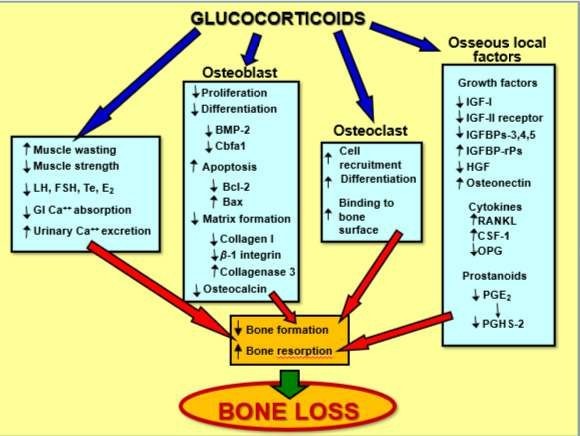A nurse is caring for an older adult client who is taking prednisone for long-term treatment of rheumatoid arthritis.
The nurse should monitor the client for which of the following adverse effects of this drug?
Liver toxicity.
Hypoglycemia.
Hemolytic anemia.
Bone loss.
The Correct Answer is D

Prednisone is a corticosteroid that can be used to treat rheumatoid arthritis and other conditions by reducing inflammation and suppressing the immune system.
However, long-term use of prednisone can cause side effects, including bone loss.
Choice A is wrong because liver toxicity is not a common side effect of prednisone.
Choice B is wrong because hypoglycemia is not a common side effect of prednisone; instead, elevated blood sugar is a possible side effect.
Choice C is wrong because hemolytic anemia is not a common side effect of prednisone.
Nursing Test Bank
Naxlex Comprehensive Predictor Exams
Related Questions
Correct Answer is C
Explanation
- A. Assist the client to a left lateral position.
- This is generally used for clients at risk of aspiration, and it's not indicated based on the lithium level.
- B. Implement fluid restrictions.
- Fluid restrictions are usually implemented when there is a risk of fluid overload or hyponatremia, and not in this case. In fact, dehydration can raise lithium levels to toxic levels, so proper hydration is important.
- C. Request a dosage increase from the provider.
- While 0.6 mEq/L is within the therapeutic range, some providers may want to see a level slightly higher for maintenance. So requesting a dosage increase from the provider is the correct action.
- D. Prepare the client for hemodialysis.
- Hemodialysis is used to remove lithium from the blood in cases of severe lithium toxicity, which is indicated by levels significantly higher than 1.5 mEq/L. This is not needed when the lithium level is 0.6 mEq/L.
Correct Answer is B
Explanation
Warfarin is an oral anticoagulant medication and is not administered subcutaneously.
The nurse should clarify this prescription with the provider before administering it.
Choice A is wrong because tetracycline can be prescribed in doses of 1 g orally every 6 hours.
Choice C is wrong because Penicillin G can be prescribed in doses of 5,000,000 units intramuscularly every 4 hours.
Choice D is wrong because Zoledronate can be prescribed as a single intravenous dose of 5 mg.
Whether you are a student looking to ace your exams or a practicing nurse seeking to enhance your expertise , our nursing education contents will empower you with the confidence and competence to make a difference in the lives of patients and become a respected leader in the healthcare field.
Visit Naxlex, invest in your future and unlock endless possibilities with our unparalleled nursing education contents today
Report Wrong Answer on the Current Question
Do you disagree with the answer? If yes, what is your expected answer? Explain.
Kindly be descriptive with the issue you are facing.
